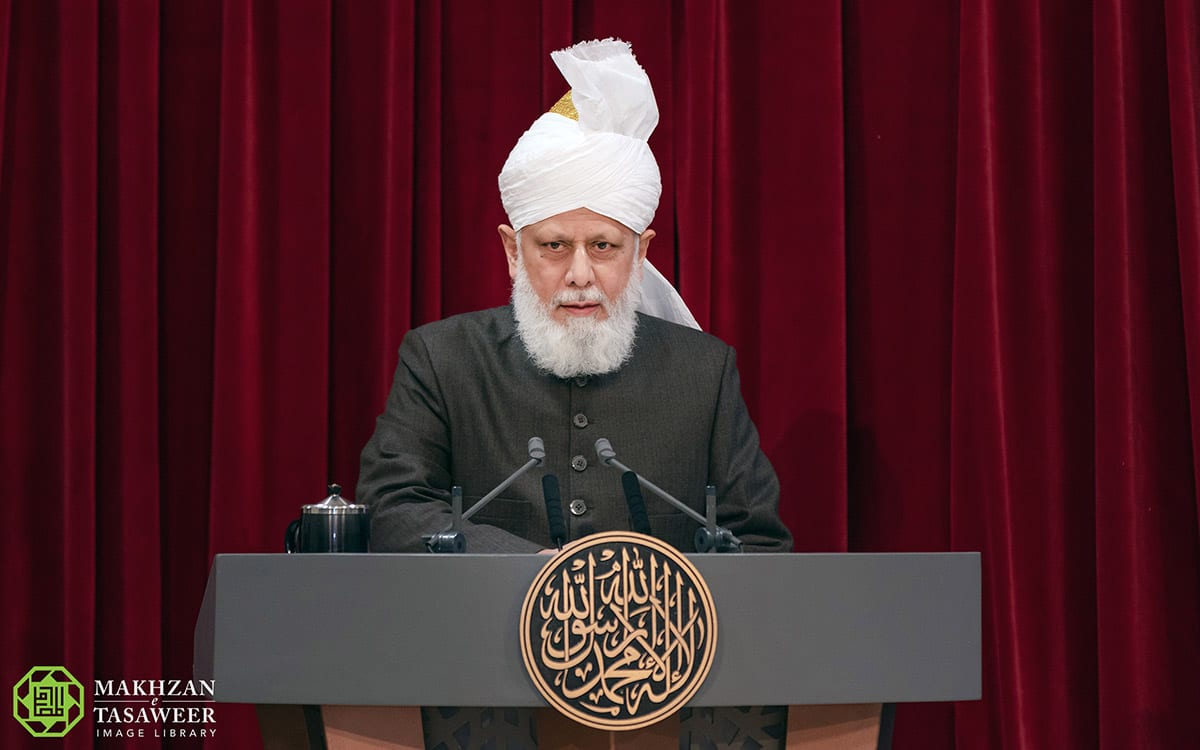Friday Sermon delivered by
Hazrat Mirza Masroor Ahmad(at)
Rightly Guided Caliphs – Hazrat Umar(ra)
After reciting Tashahhud, Ta‘awwuz and Surah al-Fatihah, His Holiness Hazrat Mirza Masroor Ahmad(aba) said that he would continue highlighting incidents from the life of Hazrat Umar(ra).
The Conquest of Damascus
His Holiness(aba) said that Damascus was besieged for several months during the time of Hazrat Abu Bakr(ra), and eventually, soon after the demise of Hazrat Abu Bakr(ra), the Muslims gained victory in Damascus. His Holiness(aba) detailed some incidents which took place after the victory of Damascus, as they took place during the time of Hazrat Umar(ra).
The Battle of Fahl
His Holiness(aba) said that a place called Fahl, a place in Syria was also conquered during the time of Hazrat Umar(ra). Hazrat Umar(ra) had instructed that the Muslims should first focus on conquering Damascus, and if they were successful in doing so, then they should make their way to Fahl. Once these lands had been conquered and the Muslims proved victorious over the Romans, Hazrat Umar(ra) instructed that the lands be left in the custody of their owners. Only some land would be used for the purpose of building mosques, otherwise the owners would retain their land.
His Holiness(aba) said that Besan was also conquered during the time of Hazrat Umar(ra). After the victory of Fahl, the Muslims encamped outside Besan. By this time, news of the losses suffered by the Romans at the hand of Muslims had spread. The Muslims lay siege to Besan for a few days, after which a few people came out to fight, and were defeated. The rest of the people of Besan agreed to terms of a treaty.
The Conquest of Tabariyyah
His Holiness(aba) said that Tabariyyah was also conquered during the time of Hazrat Umar(ra). When Tabariyyah was conquered, they requested to be presented before Shurahbil, the same person who led the conquests of Fehl and Besan, in order to reach an agreement. They agreed upon the same conditions which were settled with the people of Damascus, along with the condition that half of the houses in the cities and villages would be emptied in order for Muslims to inhabit them.
The Conquest of Homs
His Holiness(aba) said that Homs was also conquered during the time of Hazrat Umar(ra). This was a renowned place in Syria, and held great significance. The people of Homs themselves came forward to battle the Muslims, which resulted in their defeat. The weather was cold at the time, and the Romans believed that the Muslims would not be able to battle for long in an open area. It is recorded that the Romans had leather shoes, yet their feet would freeze, while the Muslims would only have normal shoes at best. Nonetheless, despite the cold, the Muslims remained resolute, and as the cold passed and the Romans realised that the Muslims could not be defeated, the people of Homs requested for a treaty to be made.
The Battle of Marj-ur-Rum
His Holiness(aba) said that Marj-ur-Rum was also conquered during the time of Hazrat Umar(ra). The Muslims battled despite the cold weather and many of them nursing wounds. A battle ensued in which the Muslims were victorious and the only people who remained alive were those who fled. As spoils, Muslims received riding animals, armour and clothes.
His Holiness(aba) said that after the victory of Marj-ur-Rum, Hamat was also conquered by the Muslims. The people of Hamat agreed to terms of a treaty. Then the Muslims proceeded to conquer Salamiya.
The Conquest of Lazica
His Holiness(aba) said that then the Muslims went on to conquer Lazica. Then the people of Lazica saw the Muslims approaching, they closed off any entrance to their city and began preparations to fight. The Muslims lay siege to the city. Hazrat Abu Ubaidah(ra) determined that laying siege would take a very long time, and even then victory would not be guaranteed. Therefore, Hazrat Abu Ubaidah(ra) devised a plan, whereby various trenches were dug, which could conceal both a horse and its rider. The next morning, when the people of Lazica could no longer see the Muslims, they became happy and came out, at which point the Muslims were able to enter the city and conquer it. Thus, the people of Lazica entered into a treaty with the Muslims. They were able to retain ownership of their castle, beside which the Muslims would go on to build a mosque.
The Conquest of Qinnasrin
His Holiness(aba) said that the Muslims then went on to conquer Qinnasrin. The people of Qinnasrin had encamped outside of their city in order to battle the Muslims. Eventually, the Muslims proved victorious over them and a treaty was agreed upon. There were some who went into the city and locked themselves in. Hazrat Khalid bin Walid(ra) told them that God would either enable the Muslims to reach them or God would convey them to the Muslims, and that their ploys were futile. Eventually, they realised their fault and surrendered. Because of what had occurred, it was determined that it would only be just to break down their castles. Then, the people of Qinnasrin were given the assurance of security, they were able to retain their lands, and only some land was used by the Muslims in order to build mosques.
The Conquest at Caesarea
His Holiness(aba) said that then there was the conquest at Caesarea. Hazrat Umar(ra) sent Yazid bin Abi Sufyan with 17,000 Muslims who lay siege to Caesarea, which at the time was a large city and was guarded by a large Roman army. The Romans attacked the Muslims but were unsuccessful and resulted in 80,000 of their soldiers being killed in battle, and including those who fled, this number reached 100,000. Hazrat Ubadah bin Samit(ra), a Companion who took part in the Battle of Badr, also took part in this battle. He acted with great bravery and encouraged the Muslims and told them that whenever he led Muslims into battle, they were always victorious. He said that he would remain at the forefront, ready to give up his life if required. As a result, the Muslims fought inspiringly against the Romans and proved victorious.
His Holiness(aba) said that he would continue highlighting incidents from the life of Hazrat Umar(ra) in future sermons.
Funeral Prayers
His Holiness(aba) said that he would lead the funeral prayers of the following deceased members:
Khadijah Sahiba wife of Molvi K. Muhammad Alvi Sahib, former missionary of Kerala. She passed away in recent days. She possessed many great qualities. She is survived by two sons and five daughters. His Holiness(aba) prayed that may Allah treat her with forgiveness and mercy.
Malik Sultan Rashid Khan Sahib passed away on the night between 22 and 23 August. His father accepted Ahmadiyyat at the hand of the Second Caliph(ra). Malik Sultan Rashid Khan Sahib served as the Amir of the Attak district. He gave precedence to his faith over the world. He was always ready and at the forefront of serving the Community. He had profound love for Khilafat, and was advanced in spirituality and his connection with God, yet he never mentioned such things to others. There were various households being supported financially by Malik Sultan Rashid Khan. He had a passion for propagating the message and many people were guided to the truth through his efforts. He spent a great deal of time in seclusion in order to pray and supplicate before his Lord. He possessed a great deal of knowledge and had read the books of the Promised Messiah(as). His Holiness(aba) said that he possessed many great and virtuous qualities. His Holiness(aba) prayed that may Allah treat him with mercy and forgiveness.
Abdul Quyyum Sahib of Indonesia who passed away in recent days. He was the son of Abdul Wahid Samatri sahib, the first non-Indian and non-Pakistani missionary. He obtained a Masters degree in Petroleum Economics and would later go on to work in various capacities in his field. Then after his retirement, he obtained a PhD in Chemical Engineering. He served his country in many ways. He proposed a formula for liquified natural gas to the government which would go on to help the government make a profit of $110 billion. His Holiness(aba) said that in this manner, even in countries where Ahmadis are persecuted, Ahmadis continue to serve their country at the highest level. He received various awards from the government and received a military funeral because of his great services. He was very caring and respectful both to his family and missionaries of the Community. He was also very kind to those working under him. In fact it was due to his kind treatment that one person was led to reading the books of the Promised Messiah(as) and later went on to accept Ahmadiyyat. He loved the Community and Khilafat a great deal. He was at the forefront of presenting any sacrifice or help needed. When the Fourth Caliph(rh) travelled to Indonesia, he stayed at his home. He never hid the fact that he was an Ahmadi and always remained proud of this. He rendered great services and financial sacrifices in the building of mosques, guest houses, and other buildings of the Community. His Holiness(aba) prayed that may Allah treat him with mercy and forgiveness.
Daud Razzaq Yunus Sahib of Benin who passed away on 27 August. He was one of the early Ahmadis in Benin. His family is not yet Ahmadi, His Holiness(aba) prayed that may Allah enable them to accept Ahmadiyyat. He was a learned member of the Community, and had obtained an MA degree from France. He was a righteous person who was regular in offering prayers. He loved the Promised Messiah(as) and his successors and would study their books. He also served for some time as the Chairman of Humanity First in Benin. He presented various financial sacrifices as well as land to the Community. His Holiness(aba) prayed that may Allah treat him with mercy and forgiveness.
Summary prepared by The Review of Religions

